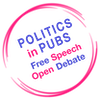City Mayors: Why do we have them?
A discussion with Nick Buckley, mayoral candidate for Greater Manchester
On 26th April ’23 Politics in Pubs met at the Welcome Inn, Bury Old Road, M45 6TA, Manchester to discuss:
City Mayors: Why do we have them? What are they for? Are they a good idea?
The discussion was introduced by our guest speaker Nick Buckley MBE.
Nick stood as a candidate for the Greater Manchester Mayor in 2021 and plans to stand again, as an Independent Candidate, in 2024. We were honoured that our meeting was Nick’s first public announcement of his intention to stand and we were happy for him to use us as a sounding board.
History of Greater Manchester Mayorality
When given the opportunity, the majority of people in Manchester have voted against elected mayors.
For example in 2012 Manchester voted against, although Salford voted for. In 2013 Bury voted against. Not only in Manchester, but throughout the UK results from referenda asking people if they wanted Mayors in their city, indicated that a majority did not.
Nevertheless, in 2014 George Osborne announced that Greater Manchester would have an elected Metro Mayor. There was no referendum. Indeed Tony Lloyd, then Greater Manchester police & crime Commissioner, was handed the role of Metro Mayor without an election in 2015.
In 2017 we had the first Mayoral election and Andy Burnham, for the Labour Party, was elected with a 63.4% majority on a 28.9% turnout. 18.3% of the the electorate voted for Andy Burnham.
The second election took place in 2021. Andy Burnham was elected with a majority of 67.3 on a 34.7% turnout. Improved figures, but 65% of the electorate did not cast a vote. Greater Manchester is made up of 10 local councils: Bolton, Bury, Manchester, Oldham, Rochdale, Salford, Tameside, Trafford and Wigan.
Why has Nick decided to stand for election?
Nick provided a critique of the concept of Mayors by pointing out that the post is often used by ambitious career politicians, not to bring about genuine improvement to an area, but rather as a stepping stone to higher office. Being independent of any political party, Nick would be in a position to provide protection to the police, who are sometimes wary of exercising power in case they are hung out to dry by party politicians looking to guard their own reputations. As Mayor Nick would “take the flack” when the police implement the law.
Nick explained his ambition to produce charters aimed at ensuring freedom of speech and addressing various issues concerning women. These charters would have no formal legal power, but would have secondary value by being endorsed by the Mayor’s office. Nick feels that all political parties are held in contempt by the majority of voters, but those that do not normally vote have the power to change our region for the better. Nick wants to tap in to their anger, frustration, knowledge and skills – and he wants to encourage debate and allow ordinary people to reclaim democracy.
Key Messages (still in rough form)
Yes to Free Speech – creation of a Free Speech Charter
Yes to Women – definition of the word woman will be clearly stated
No to Net Zero – no to green policies that make us poorer; more debate on Net Zero
No to the Mayor – a referendum on whether we want a mayor and a mayor’s office
Discussion
Nick expanded on these key issues and on other policies he would like to implement on areas such as rough sleeping and homelessness (on which Nick has a wealth of experience and expertise) and stopping waste and incompetence in local government spending.
There was general agreement that the 4 key messages would interest voters – whilst attracting condemnation and accusations of transphobia, climate denial etc. from a vocal minority. Nick is aware of this and intends to counter by attending grass roots meetings and using social media to get his message across. He’s hoping to receive professional help – and general help – from a range of people. He has already had useful talks with organisations such as the Free Speech Union and Women’s Rights Groups.
We are growing
We are expanding our activities with more Politics in Pubs groups. Our Newcastle group has its second meeting coming up soon and there are plans for groups to meet regularly in Ilkley and Sheffield. Find out more below how you can get involved.
We have created a map where you can search for a group near you.
Don’t worry if you can’t find anything nearby as you can start your own group. If you would like to be put in touch with other people interested in talking about politics, please reply to this email letting us know your location and we’ll help to get the conversation started.
We are also planning to network with other free speech groups who have a similar interest in open discussion and debate. If you have such a group and want to appear on our map please get in touch.

